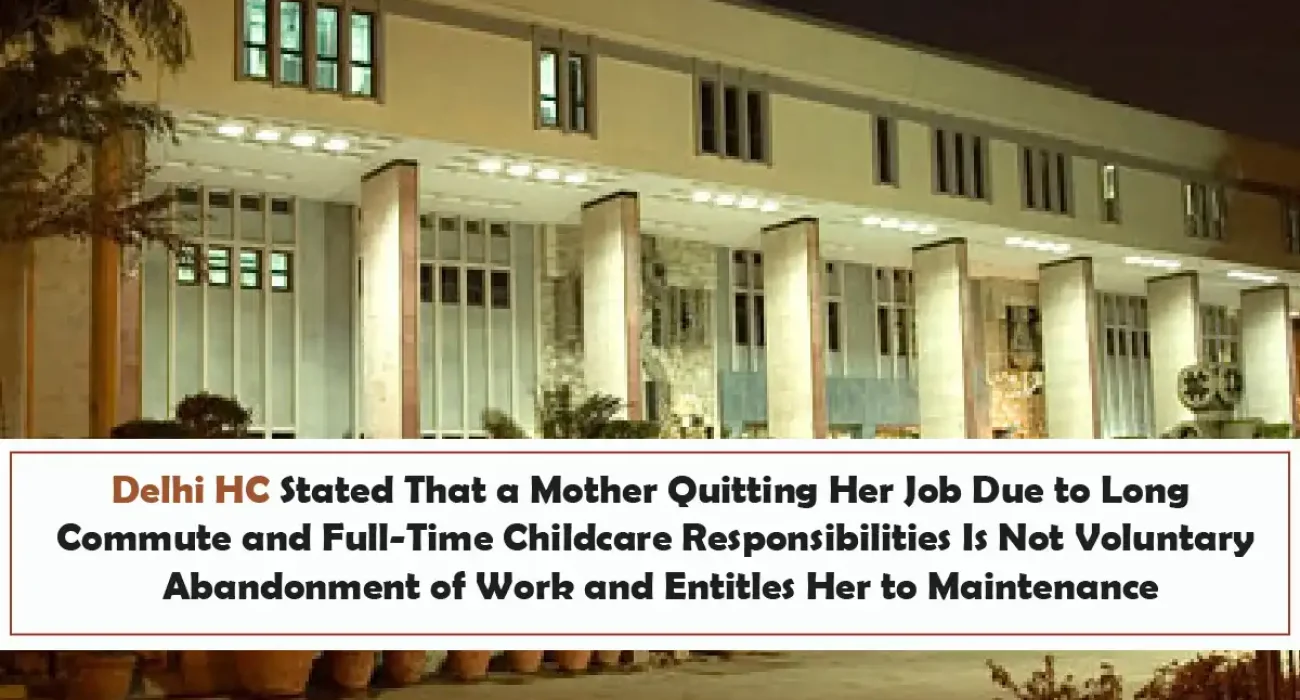

Table of Contents
ToggleThe present case arose from a revision petition filed by a husband challenging an interim maintenance order passed by the Family Court, Rohini, on 21.10.2023. The parties were married in January 2016 and have a six-year-old child, currently in the mother’s custody. Since July 2017, the couple has been living separately. The respondent-wife, formerly employed as a guest teacher with the Delhi Government, lost her contractual job in December 2022. She filed a petition under Section 125 CrPC, seeking maintenance for herself and the minor child. The Family Court awarded her ₹7,500 per month each for herself and the child, with arrears payable from January 2023 onwards, noting that she was not entitled to maintenance for the period she was earning.
The petitioner-husband, a practicing advocate, argued that the maintenance award was excessive and based on erroneous assumptions. He claimed that the wife is highly qualified (M.A., B.Ed.) and had been earning ₹40,000–₹45,000 monthly through teaching and tuitions. He maintained that she was financially capable and filed the maintenance petition only to harass him. Furthermore, he submitted that he earns only ₹10,000–₹15,000 per month and supports his elderly mother. The petitioner also argued that the wife left the matrimonial home voluntarily and had disregarded a previous order directing her to rejoin him. He challenged the Family Court’s notional assessment of his income at ₹30,000 per month as speculative and unsubstantiated.
The respondent-wife contended that she had been compelled to quit her job due to the long commuting hours and the full-time responsibility of raising their minor child without any support. She argued that she is currently unemployed and that her role as the sole caregiver has significantly limited her ability to engage in paid employment. Her counsel emphasized that the petitioner was concealing his true income and that his bank statements indicated large deposits. It was also submitted that the Family Court rightly relied on notional income in the absence of credible disclosure from the petitioner. The wife maintained that she was entitled to maintenance, especially given the high cost of living in Delhi and the absence of any financial support from the husband.
The Delhi High Court upheld the Family Court’s reasoning and recognized the practical difficulties faced by a single mother. The Court found the wife’s explanation for her unemployment reasonable and rooted in the reality of caregiving challenges. It observed:
“The cessation of employment by the respondent cannot be viewed as voluntary abandonment of work, but as a consequence necessitated by the paramount duty of childcare.”
Referring to the Supreme Court’s ruling in Rajnesh v. Neha, the Court reiterated that, “It is not the potential earning capacity of the wife but her actual income at the relevant time that is to be considered while determining the amount of maintenance.”
The Court emphasized that the primary caregiver’s responsibilities often limit their ability to work and that the law must recognize this disproportionate burden. It also noted that while estimating notional income was not inherently flawed, the Family Court should have clearly recorded the deficiencies in the petitioner’s financial disclosures.
The High Court upheld the principle that maintenance must be determined considering the actual circumstances of the claimant, not theoretical earning capacity. It remanded the matter back to the Family Court to reassess the interim maintenance, specifically directing it to consider the income affidavits and bank statements of both parties and to issue a reasoned order within one month.
Meanwhile, the Court directed the petitioner to continue paying ₹7,500 per month to the wife and ₹4,500 to the child, on an interim basis, until the Family Court issues its fresh order. These payments were to be made by the 10th of each month and would be adjustable against the final determination.
Credits: Adv. Deeksha Rai
IAW resources
Browse our help directory